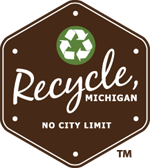SPEAK OUT
How to be a Recycling Advocate
1. Know What Your Community Offers
So you’re interested in being apart of a positive change in your community, but you don't know where to start. Recycling is so important to maintaining a healthy environment, and no action or person is too small to make a difference. To start your advocacy journey, we recommend three primary steps. Follow our guide for getting more involved in recycling at the local level today.
1. Know What Your Community Offers
The first step to advocating for recycling and sustainable waste services is understand what recycling opportunities are currently available to you. Your city or township government will be your first point of contact about what recycling services are available to you. You can start by searching your local government website, contacting your county recycling coordinator here, or by finding what service providers are available near you with the EGLE Recycling Directory Map.
2. START A PETITION
3. CONTACT YOUR REPRESENTATIVE
If you've searched far and wide for recycling services in your area and did not find what you were looking for, it is time to speak to your local officials. Sharing with your local government contact or leadership what services would be valuable to you is the first step to advocate for expanding those services. Whether you want to see your area expand disposal for organic waste, drop-off centers for electronics and hazardous waste, or curbside recycling, you can be the voice that sparks change.
One way to communicate a larger need for a service in your area is by starting a petition. A petition can demonstrate to your local government that there isn't just one person that wants to see recycling grow where you live, work, and play, there are many.
3. CONTACT YOUR REPRESENTATIVE
 If you haven't gained much traction locally you might consider reaching out to your state representatives. Every resident has representation in the House of Representatives and the Senate. Whether you'd like to see more recycling opportunities in your community or a stronger focus on sustainable materials management, reaching out to your legislature is a vital part of advocacy. Learn More here.
If you haven't gained much traction locally you might consider reaching out to your state representatives. Every resident has representation in the House of Representatives and the Senate. Whether you'd like to see more recycling opportunities in your community or a stronger focus on sustainable materials management, reaching out to your legislature is a vital part of advocacy. Learn More here.
